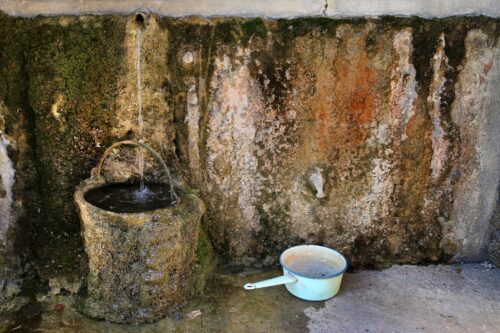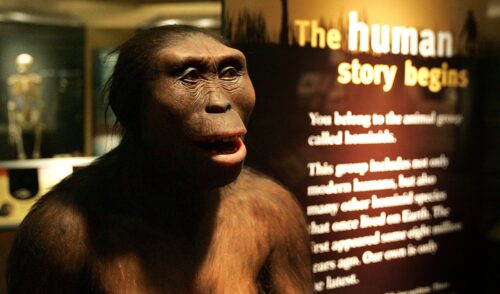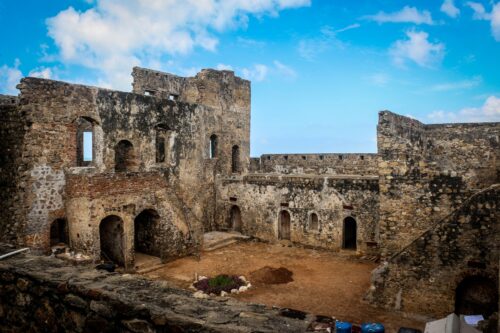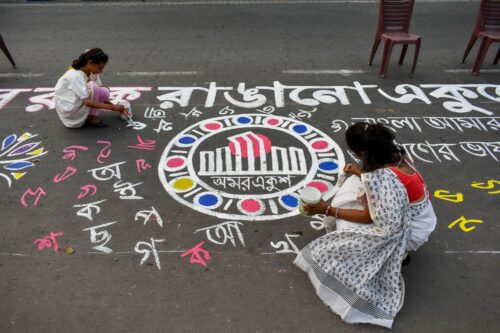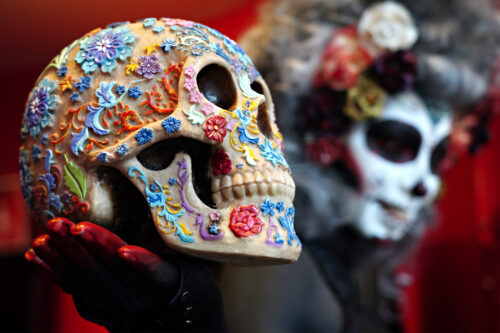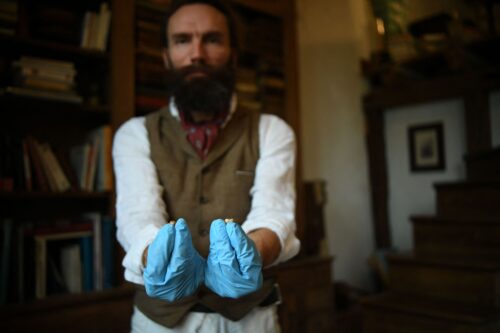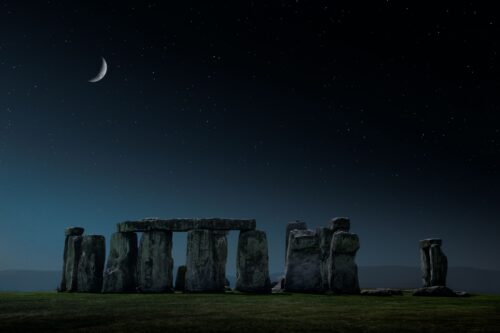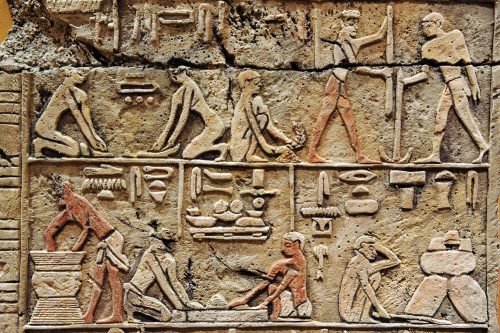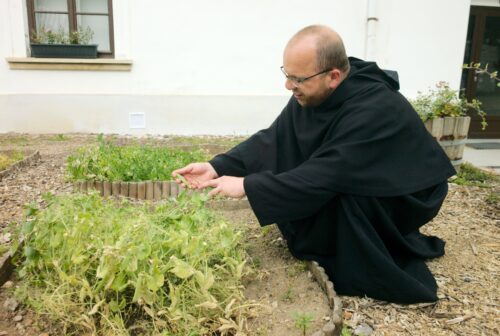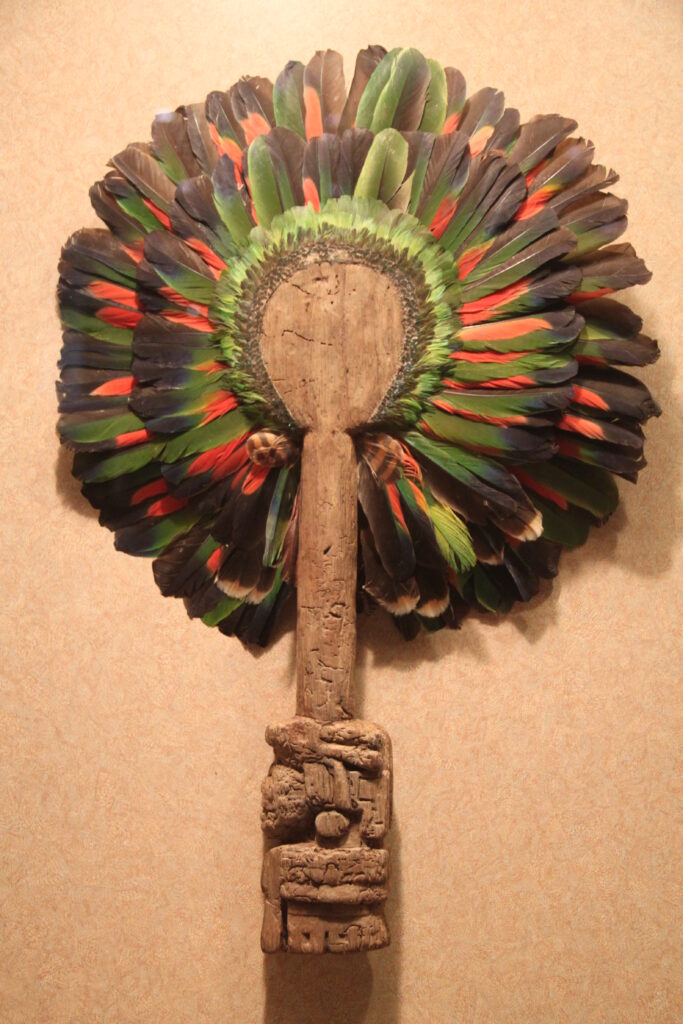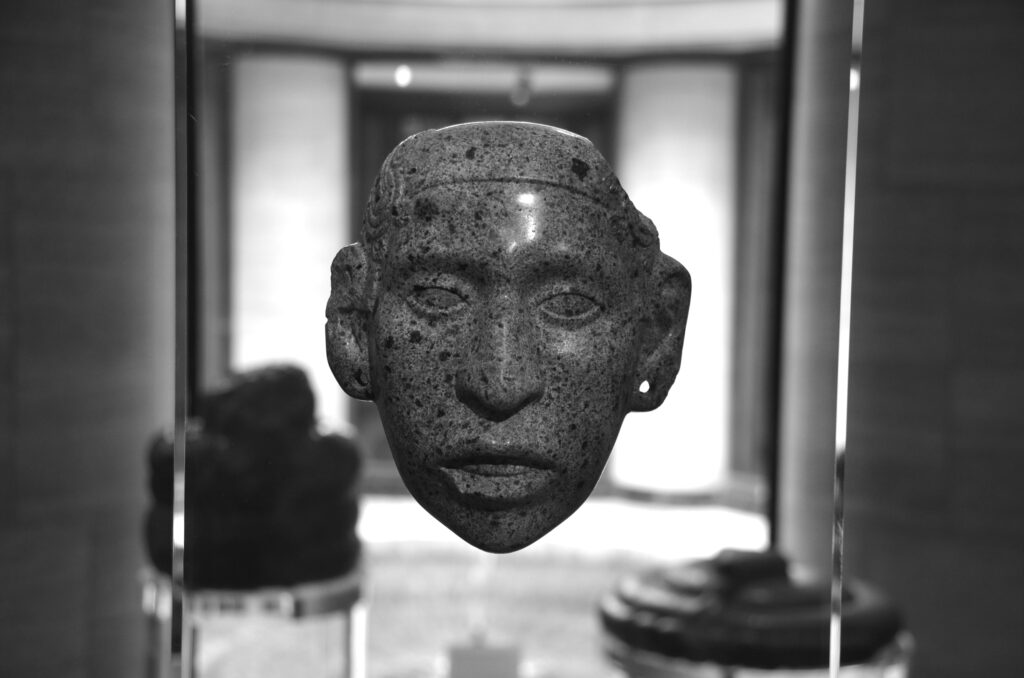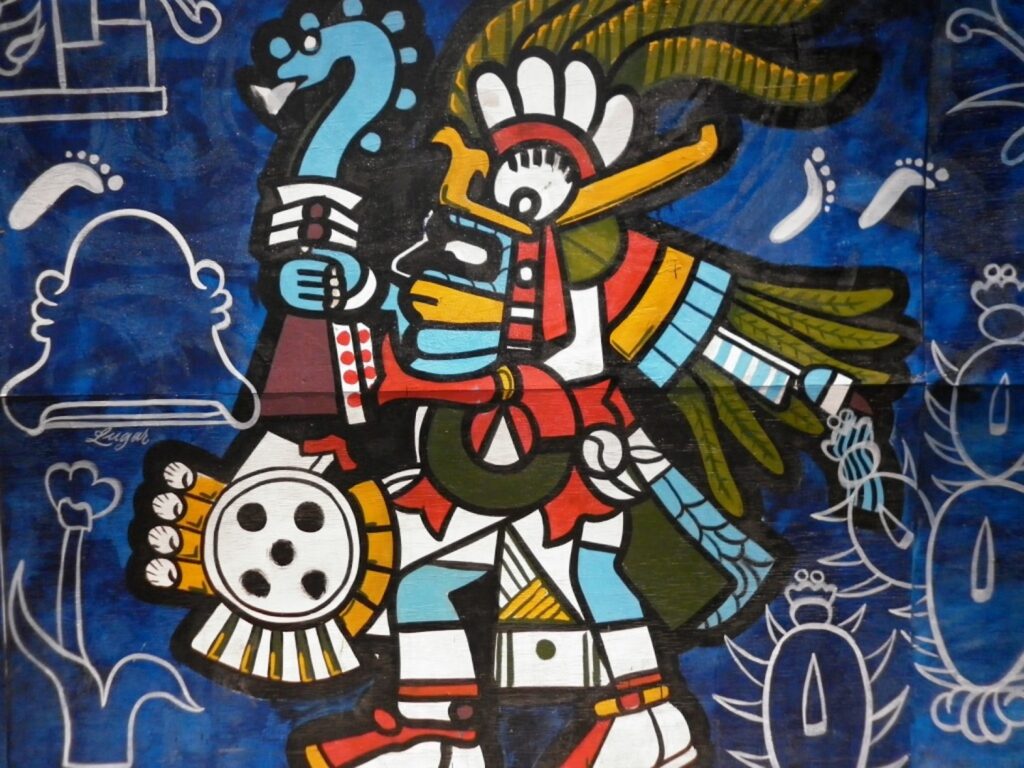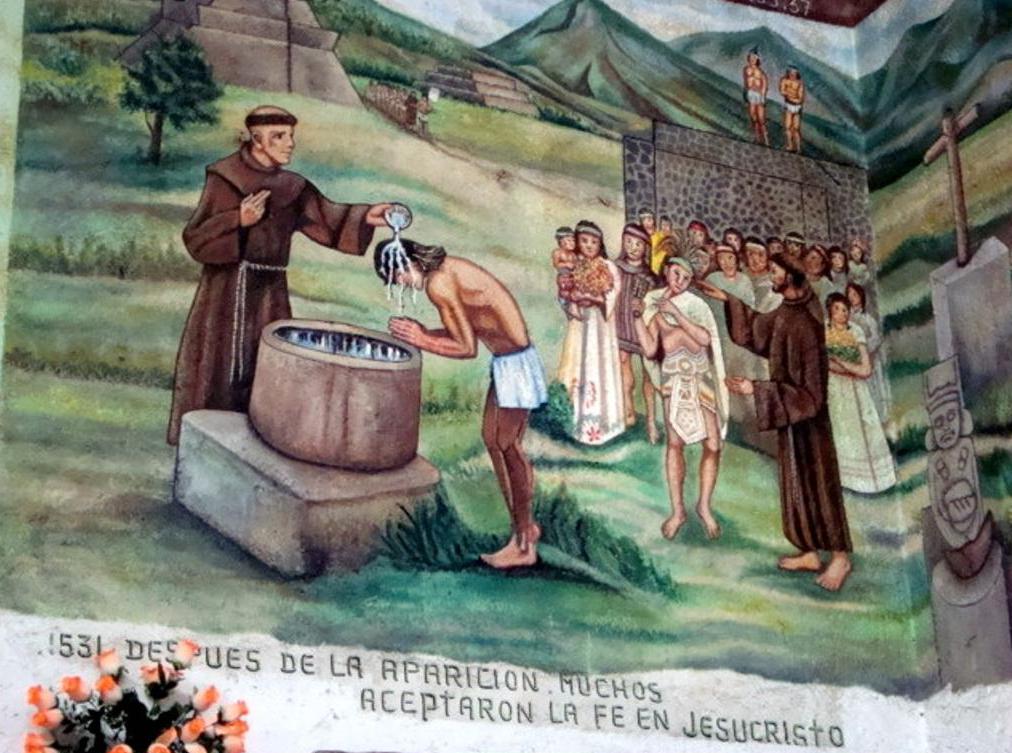Aztec Antichrist: A Performance of the Apocalypse
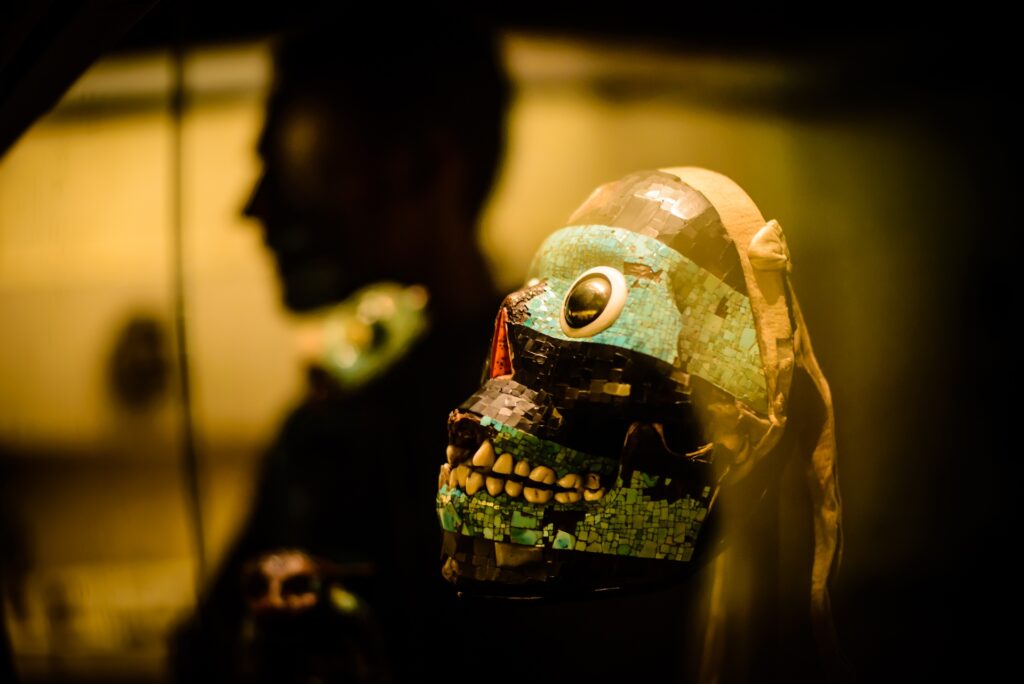
Excerpted from Aztec Antichrist by Ben Leeming. © 2022 by the Institute for Mesoamerican Studies. Published by University Press of Colorado. Courtesy of University Press of Colorado.
✽
In 2014, at the Hispanic Society of America in New York, I examined a long-forgotten notebook written by a Nahua nobleman named Fabián de Aquino sometime after 1560. [1] [1] Nahuas are speakers of Nahuatl, the language of the Aztecs, who migrated to what is now Central Mexico around the 13th century and developed a powerful empire. Since the Aztec Empire was brought to an end by the Spanish-Aztec War of 1519–1521, Nahuatl speakers from the colonial period onward are referred to as Nahuas. I use “Aztec” for the period before 1521 and “Nahua” for the period afterward. To my surprise, the notebook contained two religious plays that may be the earliest surviving presentations of the medieval legend of the Antichrist in the Americas. They could also very well be the earliest surviving play scripts in the Americas.
These often-shocking plays and the remarkable writings in Aquino’s notebook offer unique insights into the early encounters between Christianity and Indigenous cultures. I have written about these findings in my new book, Aztec Antichrist, and in SAPIENS in the essay “The Aztec Antichrist Chronicles Stories of Indigenous Resistance and Religious Conversion.” Within the book, I also translated the two plays, which I have given the titles Antichrist and the Final Judgment and Antichrist and the Hermit, from Nahuatl into English.
The following is a condensed excerpt from Antichrist and the Hermit, the author of which may have been Aquino or another Indigenous writer. In the full play, Antichrist tries to tempt newly converted Indigenous people away from Christianity, and a character named Hermit interrogates 25 characters—from Aztec deities to a divination specialist. These characters confess to committing sins that in many cases involved the perpetuation of traditional Indigenous rituals that the Roman Catholic Church was attempting to eradicate at that time.
Both acts are excerpts and have been lightly edited for style.
Antichrist and the Hermit
Here begins what is called “a play”; it is to be said with words only. First, she who is called Sibyl will say, [2] [2] A sibyl is a pagan oracle that medieval tradition imagined as having predicted the return of Christ at the end of time.
Sibyl:
O my children, please look here! Perhaps you have heard what I have come to tell you. Today I will repay you well. You will know that by his command Only Deity, God, has sent me to tell you that the whole world will end. There will be dying everywhere; nothing will be left behind for it will all be burned. But before the world ends, first a wicked person will come, will be born, whose name will be Antichrist. But in order to thoroughly deceive you, he will call himself Christ. [However,] he is really just a were-owl. [3] [3] A “were-owl” or “human horned owl” (tlacatecolotl in Nahuatl) is a shape-shifting shaman figure. Early missionary priests and their Native assistants used this term for “devil” and “demon” in their doctrinal writing. It’s an example of the ways the Spanish demonized shamanistic traditions.
He will come to give you gold and cloaks, et cetera. So that you will go with him, he will say to you, “I am Christ,” and with this he will deceive you. He will cause those who obey him to marvel. The bad ones will believe in him alone, and the good Christians will die for God in order to go to the heavens. Today, O my children, take strength! Do not accept anything he gives you so that you will not go suffering forever with him in Mictlan. [4] [4] Mictlan was one of several “otherworlds” in the cosmology of Nahuatl-speaking peoples at the time of European contact. Since Mictlan was thought to be located underground, it was chosen by the early priests and their Native assistants as an equivalent of hell.
Strengthen yourselves so that you will die for God. Do not lose heart! Do not become faint! Follow the example of the saints, for they died by the hands of others for God, [and] because of this they ascended to his home. O please won’t you believe in Only God, Jesus Christ! Be baptized, confess, take courage! Don’t let [Antichrist] fool you into thinking that he came to teach you God’s pronouncements. May God give you his goodness, may he guard you. Now I take my leave of you.
Antichrist:
Do stay seated, O my children. [5] [5] “Do stay seated” (ximehuiltihtiecan) is a polite greeting in Nahuatl. This is one of many examples of Antichrist speaking in the formal style of an Indigenous nobleman or respected authority. Come, all of you. What are you doing? Do you want to die by my hand? Right now I will spill your blood if you do not believe in me. Have you not seen that those living with me are rich? Did I not say to you that I alone am all powerful, that I made all that lies growing? Do not behave foolishly! Why did you dismantle my home? [6] [6] “Home” refers to a temple where the Aztecs paid homage to their deities before European contact. The author is likening Antichrist to Aztec deities—a common rhetorical strategy used to persuade Indigenous people to abandon their former gods.
In times past, you served me well when you slashed open the chests of your captives and when you bled yourselves. And you, O rulers, why do you diminish your way of living? Why do you abandon your women? You used to have many mistresses! Now, devote yourselves to all the women, however many you want. This will really satisfy me. And also you women, I really wonder at you. You do not paint your faces anymore; you do not cover yourselves with feathers. [7] [7] Antichrist is trying to tempt converted Indigenous people back to the religious practices of their ancestors: sacrifice, polygyny, and traditional adornments such as feathers. And now, what has happened to you? Who has confused you? Devote yourselves to everything that you used to devote yourselves to!
O my children, didn’t you used to honor my words? I am your deity, your ruler! I am Christ! Please come, for I will make you rich! You will greatly rejoice and rest yourselves there at my home; you will go reaping your reward. Why don’t you want to believe in me? Don’t you want to come with me? Look at those wicked ones! I will kill them!
[Martyr will say,]
Who are you?
[Antichrist will say,]
It is I, Christ.
Then they will say to him,
Where do you come from?
Then he will say,
From up there, my home in the heavens.
Then they will say to him,
Where is your home?
He will say,
Up there, in the heavens! Today I have come to save you. I have come to teach you, to show you the straight road that is to be followed in order for people to go to my home. There will be resting there. Today I have come to make you rich. I don’t want you to be troubled. I love you very much, for you are my children. I really, really pity you because of all those who went around teaching you, those who went around deceiving you. [8] [8] This is a reference to the members of the Franciscan and Dominican orders who were the first missionaries among the Nahuatl-speaking peoples of New Spain. Do not believe what they said to you! If you do not obey me, then I will slay you with my own hands. However, if you don’t want to die by my hand, then I will make you very rich, for I am the deity, I am Christ.
And then Martyr will say to him,
What is the proof that you are Christ? The cross on which you died is meaningless because what you’re carrying there is meaningless. Therefore, you seem to be lying. It is written that when the true Jesus Christ comes appearing, when he comes judging people, he will come bearing his cross so that he will be clearly recognized.
And furthermore, it is written that a person will be born on Earth who will be followed like a deity. Because of this he will deceive many; because of this people won’t believe. Indeed, when our Lord ascended to the heavens, he told us that one would be born whose name would be Antichrist. Moreover, this proves that it is you because you don’t teach us what Jesus Christ the true God taught us. Therefore, I don’t want to believe in you, for you want to deceive us! I absolutely do not want your bribes!
I want to live suffering for the true God so that he will have mercy on me, so that I will merit the joy of the heavens. God says in order for there to be saving of people and going to the heavens, there must be weeping, there must be sadness, there must be abandoning of sin on Earth, there must be suffering. But you say, “Let there be happiness, enjoyment, riches everywhere!” This confirms that you are not the true Christ.
The following excerpt comes from the second act of the play, in which a character called Hermit interrogates damned sinners and Aztec gods. This inquisition of Aztec deities—all of whom confess they are not gods but mere creations of the Christian God—is one of the most shocking and unique features of the play.
Huitzilopochtli
Then Hermit will say,
Tell me, you, what is your name?
[Huitzilopochtli] will say,
It is I, Huitzilopochtli. [9] [9] Huitzilopochtli was the patron deity of the Aztecs and was associated with the sun and war. He was a warrior god who led the Aztecs’ ancestors from their place of origin to the site where their capital city of Tenochtitlan was founded. Here, Huitzilopochtli represents “anger,” one of the Seven Deadly Sins. I went around deceiving the common people. They used to consider me a deity, [but] I’m only God’s creation. Because of my sins, he cast me into Mictlan where I am continually burning. The common people used to celebrate a feast in my honor when it was my feast day, et cetera. Now my heart is sad because the Christians have arrived.
I have been weeping greatly because the priests came to teach you. If only it had been just the Christians who had come, perhaps I would have been able to deceive them; perhaps I would have been able to fool them; perhaps I would have brought some others to Mictlan because of their sins. [10] [10] The author makes a distinction between “priests” and “Christians.” It seems that the latter refers to Spaniards, who were infamous for being poor representatives of the faith. The priests tried to keep Spaniards away from Indigenous Christian communities because of their negative influence. Those priests just hold me back when they go around teaching them, and as a result, there is life-changing, there is confessing, there is abandoning of sins. The hearts of those priests are exceedingly strong, and, thus, they cause [people] to abandon their sins. Even though many times I place bad, improper things within them, they don’t obey me at all. If some priest does it, then they confess and cleanse their souls, earnestly doing penance. With this God is placated so that it is impossible for me to bring them to Mictlan.
But the other Christians, the bad ones, they live devoted to sin. Even though they confess every year, they’re doing it in [a state of] sin. I am satisfied when some die in mortal sin because I bring them to Mictlan. But I am sad because my house was knocked down, my image was destroyed. [11] [11] The temple dedicated to him was destroyed. The destruction of temples in the Central Valley of Mexico happened quite early in the colonial period. I am very sad because the cross of Jesus Christ arrived. I am really afraid when a person willingly raises it up, then it is not possible for me to deceive him.
Then Hermit will say,
Alas! Please go, you wicked one! The common people have now recognized you. And furthermore tell me, what is in your hands?
[Huitzilopochtli will say,]
Know that this potion is called “anger-potion.” With it I bathe them, and I place anger inside others so that they scold each other, so that they become angry with each other, so that they kill each other, so that they devour each other, so that they will not go to God’s home. They will burn forever with me. This is my job forever.
And then Hermit will say,
Yes, indeed. If you were truly the deity, you wouldn’t want there to be devouring of people. This confirms that you are wicked! Please go!
Young Woman
Then Hermit will say,
I ask you, who are you?
Then she will say,
I am a young woman. I am Cecilia.
[Hermit will say,]
Why did you go to Mictlan?
Then she will say,
Because when I was a young woman, I would devote myself to serving God to the point where I didn’t want to live as a married woman. [12] [12] Even though she was utterly devoted to God, the young woman’s sin was refusing to get married. In the church’s teaching, this refusal threatened to lead a woman into sexual sin. Teaching on this subject was part of the church’s program targeting the sexual mores and marriage practices of Indigenous peoples. But just one time, the were-owl deceived me. I secretly grabbed this boy and laid him down on me. Even though it was not possible for him to commit adultery with me, I greatly offended God. If only I had married! Then the were-owl would not have deceived me so many times.
I confessed frequently, but this one single sin I never revealed. I never said it to the priest. I just hid it because my sins shamed me greatly. Even though I lived very penitently, because I died in sin, God cast me into Mictlan. If only I had confessed, God would have had mercy on me. But now I will never be saved; he will never have mercy on me. I will always suffer, always go around carrying that boy on my back because he slept with me, and with him, I am continually burning. It is like this also for the many others who are there.
Then Hermit will say,
So be it! Please go, you wicked one!
Healer
Then Hermit will say,
I ask you, who are you?
Then [Healer] will say, [13] [13] A healer (ticitl) is a practitioner of Indigenous medicine and curing rituals. The Spanish priests were deeply concerned about this kind of Indigenous ritual specialist, both for their supposed collaboration with the devil and for the central importance they played in the lives of the commoner class.
It is I, Antonio. I am a healer.
[Hermit will say,]
And why did you go to Mictlan?
Then [Healer] will say,
Because I really devoted myself to healing and so deceived many because of it. My job was this: I scattered shelled maize grains before people; I used to count them. And those who I hated, I treated in such a way that they would die. Even though I heard the sacred words many times, I absolutely didn’t want to confess; I absolutely didn’t want to abandon my wickedness. And now because of this God has cast me down to Mictlan. Now I will always go along carrying on my back everything with which I divined. [14] [14] This probably refers to the objects the healer used in divining rituals. Because of this I am suffering greatly, and those who I considered deities are whipping me; they’re just the were-owls I called upon when I was divining.
Then Hermit will say,
Come now! How did you divine and so deceive the common people? Please, divine it!
Then here the diviner will make his prognostication. [15] [15] Presumably, the character will perform an impromptu divination ritual. This is another shocking aspect of the plays, since such performances would have been deemed heretical and were unheard of in other colonial Nahuatl religious theater.
Then Hermit will say,
Alas, you liar! Don’t you know what God taught while you were still living on Earth?
Then he will say,
So be it! Please go, you wicked one!
[Addressing the audience:]
Moreover, O healers, don’t do this! Don’t make women drink potions. [16] [16] By potions, the author meant abortifacients. It is absolutely not good that women who are pregnant abort their children. Don’t make them drink bad potions in order to become sterilized so that you will not go to Mictlan.
Cuiloni
Then Hermit will say,
I ask you, who are you?
Then [Cuiloni] will say, [17] [17] Since early colonial times, cuiloni has been translated as “sodomite” and cuilontia as “sodomy.” Because these terms are considered deeply hurtful today and because Indigenous sexual mores differed in important ways from European one, I follow the practice of leaving them untranslated.
It is I, Gonzalo.
[Hermit will say,]
Why did you go to Mictlan?
Then [Cuiloni] will say,
Because of one single, great mortal sin. It is very frightening, let me not utter it! It is really frightening, it really shames me, it really renders me mute!
Then [Hermit] will say,
Alas! It didn’t shame you when you did it! And now afterward it shames you? By God’s command I say to you, declare it now!
Then Cuiloni will say,
Woe is me! Now you will know that I am a cuiloni. I satisfied myself greatly when they did cuiloni to me. It was I who provoked others to sleep with me. If only I hadn’t been such a coward, they would not have done cuiloni to me. God really despises that particular sin. This was the reason that long ago the flood spread over the world. Everyone was carried away by the water; they died by the water because they went around doing cuiloni. By God’s command only eight were saved in the boat. And one person, God’s beloved, was saved along with his two children. His name was Lot. [18] [18] Here the author of the play conflates two different passages from scripture: the story of Noah and the flood, and the story of Lot and the destruction of Sodom and Gomorrah. Along with other passages like it, I interpret this as evidence that the play was written with little to no supervision by a Spanish priest.
Because of this you will know that God greatly despises those who go along doing cuiloni to others. If only I had desisted from my bad way of life, if only I had confessed, God would have had mercy on me. But I didn’t confess, and because of this I am suffering terribly. Those who did cuiloni to me go along whipping me. They descended to Mictlan because of me. This is my sin.
Then Hermit will say,
So be it! Please go, you wicked one!
Then he will say [to the audience],
Now spit on them, all of you! It is necessary that the cuilonimeh be [cast] into the fire. [19] [19] Cuilonimeh is the plural of cuiloni.








